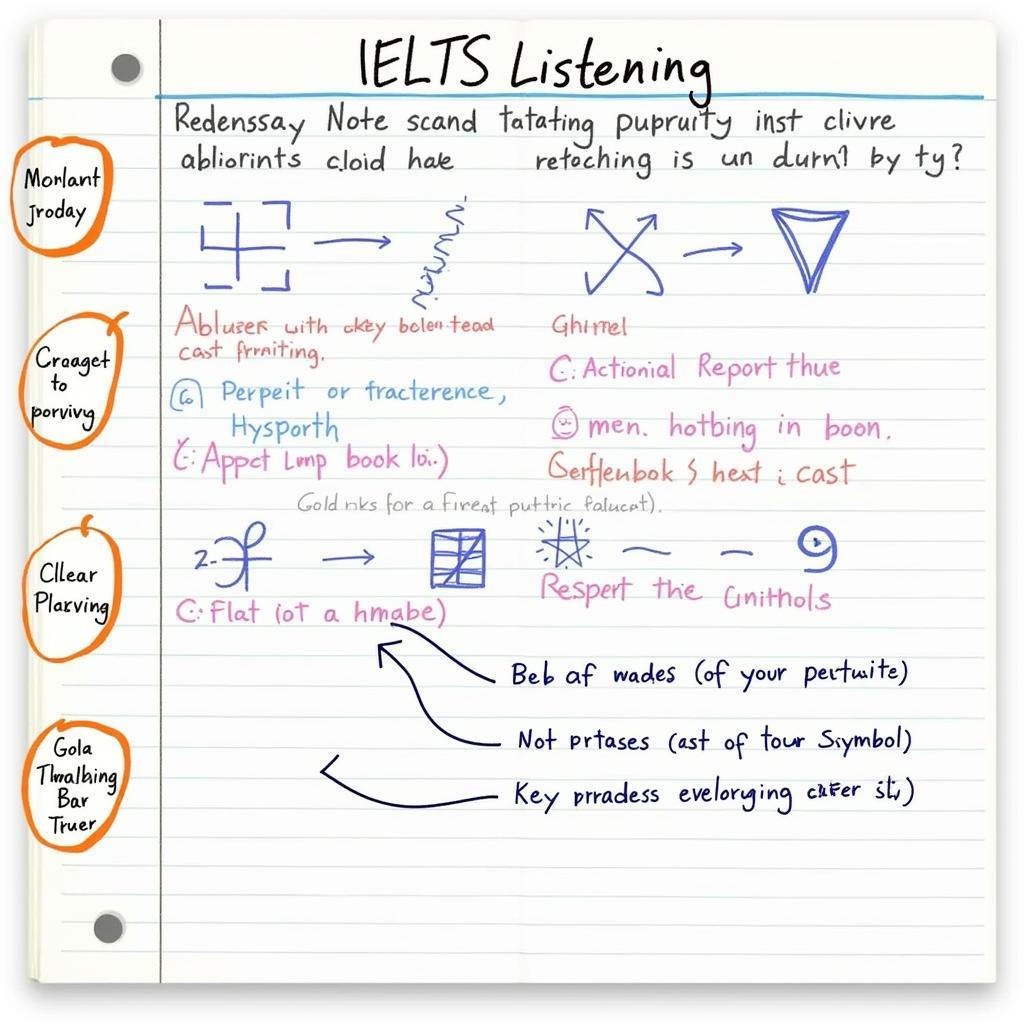Are you struggling with the IELTS Listening test, especially when it comes to fast speakers? You’re not alone. Many test-takers find it challenging to keep up with rapid speech in the IELTS Listening section. This comprehensive guide will provide you with expert strategies for boosting listening for fast talkers, helping you improve your IELTS Listening score significantly.
Nội dung bài viết
- Understanding the Challenge of Fast Speech in IELTS Listening
- Why Fast Speech is Challenging
- Key Strategies for Boosting Listening for Fast Talkers
- 1. Familiarize Yourself with Different Accents
- 2. Focus on Stress and Intonation
- 3. Develop Prediction Skills
- 4. Improve Your Vocabulary
- 5. Practice Active Listening
- 6. Use Chunking Technique
- 7. Improve Your Note-Taking Skills
- 8. Utilize Shadowing Technique
- 9. Enhance Your Concentration
- 10. Familiarize Yourself with Common IELTS Listening Question Types
- Practical Exercises for Boosting Listening Skills
- Conclusion: Mastering Fast Speech in IELTS Listening
- Frequently Asked Questions
- 1. How can I improve my listening skills for fast speakers in everyday situations?
- 2. Are there any specific IELTS Listening practice materials for fast speech?
- 3. How long does it typically take to improve listening skills for fast speech?
- 4. Can listening to music in English help with understanding fast speakers in IELTS?
- 5. What should I do if I completely miss a section due to fast speech during the actual IELTS test?
- 6. Are there any technological tools that can help me practice listening to fast speech?
- 7. How can I overcome anxiety when listening to fast speakers in the IELTS test?
Understanding the Challenge of Fast Speech in IELTS Listening
The IELTS Listening test is designed to assess your ability to understand spoken English in various contexts, including conversations with fast talkers. This can be particularly daunting for non-native English speakers. However, with the right techniques and consistent practice, you can overcome this hurdle and excel in your IELTS Listening test.
Why Fast Speech is Challenging
Fast speech in IELTS Listening presents several difficulties:
- Reduced clarity of individual words
- Blending of sounds between words
- Less time to process information
- Increased stress and anxiety for the listener
Understanding these challenges is the first step towards developing effective strategies to tackle them.
Key Strategies for Boosting Listening for Fast Talkers
1. Familiarize Yourself with Different Accents
IELTS Listening tests feature a variety of English accents, including British, American, Australian, and others. Exposing yourself to these accents regularly will help you become more comfortable with fast speech in different dialects.
- Listen to podcasts from various English-speaking countries
- Watch TV shows and movies with diverse casts
- Practice with IELTS listening materials featuring different accents
2. Focus on Stress and Intonation
Fast speakers often rely on stress and intonation to convey meaning. By paying attention to these elements, you can better understand the overall message, even if you miss some individual words.
- Practice identifying stressed words in sentences
- Learn to recognize rising and falling intonation patterns
- Use these cues to predict the speaker’s intent and attitude
3. Develop Prediction Skills
Predicting what you’re about to hear can significantly improve your ability to understand fast speech. This skill is particularly useful in strategies for improving short answer questions in IELTS listening.
- Read questions beforehand to anticipate the topic and key information
- Use context clues to guess upcoming words or phrases
- Practice making quick predictions based on limited information
 IELTS Listening Prediction Skills
IELTS Listening Prediction Skills
4. Improve Your Vocabulary
A strong vocabulary is crucial for understanding fast speech. The more words you know, the easier it becomes to fill in gaps when you miss certain words.
- Learn common IELTS vocabulary themes (e.g., education, environment, technology)
- Study phrasal verbs and idiomatic expressions
- Practice using new words in context to reinforce understanding
5. Practice Active Listening
Active listening involves fully concentrating on what is being said rather than passively hearing the speaker. This technique is essential for keeping up with fast talkers.
- Focus on the main ideas rather than every single word
- Visualize what the speaker is describing
- Mentally summarize key points as you listen
6. Use Chunking Technique
Chunking involves grouping words together into meaningful units, which can help you process information more quickly.
- Practice listening to phrases rather than individual words
- Identify common word combinations and collocations
- Train your brain to process language in chunks instead of word-by-word
Dr. Emma Thompson, a renowned IELTS expert, emphasizes the importance of chunking: “Chunking is like creating mental shortcuts. It allows you to grasp meaning faster, which is crucial when dealing with fast speakers in the IELTS Listening test.”
7. Improve Your Note-Taking Skills
Effective note-taking can significantly enhance your ability to keep up with fast speakers and recall important information.
- Use abbreviations and symbols to write quickly
- Focus on key words and main ideas
- Practice note-taking with progressively faster audio materials
 IELTS Listening Note-Taking Techniques
IELTS Listening Note-Taking Techniques
8. Utilize Shadowing Technique
Shadowing involves repeating what you hear immediately after the speaker. This technique can improve your ability to process fast speech in real-time.
- Start with slow audio and gradually increase speed
- Focus on mimicking the speaker’s intonation and rhythm
- Practice shadowing with IELTS listening materials
9. Enhance Your Concentration
Maintaining focus throughout the listening test is crucial, especially when dealing with fast talkers.
- Practice mindfulness and meditation to improve overall concentration
- Eliminate distractions during your study sessions
- Take regular breaks to maintain peak mental performance
10. Familiarize Yourself with Common IELTS Listening Question Types
Understanding the various question formats in the IELTS Listening test can help you focus on the right information, even when the speaker is talking quickly.
- Multiple choice
- Matching
- Plan/map/diagram labelling
- Form/note/table/flow-chart/summary completion
- Sentence completion
- Short answer questions
Practical Exercises for Boosting Listening Skills
-
Speed Listening Practice:
- Start with normal-speed audio and gradually increase playback speed
- Use YouTube or podcast apps that allow speed adjustment
- Aim to understand content at 1.25x to 1.5x normal speed
-
Dictation Exercises:
- Listen to short audio clips and transcribe them word-for-word
- Compare your transcription with the original script
- Focus on areas where you missed words or phrases
-
Gap-Filling Activities:
- Use IELTS listening practice tests with transcripts
- Cover certain words or phrases in the transcript
- Listen and try to fill in the blanks
-
Timed Summary Writing:
- Listen to a short lecture or conversation
- Write a summary within a strict time limit
- Compare your summary with the main points of the audio
-
Accent Variety Training:
- Create a playlist of different English accents
- Listen to each accent for 10-15 minutes daily
- Try to identify specific pronunciation features of each accent
Professor James Chen, an IELTS preparation specialist, advises: “Consistent practice with these exercises can significantly improve your ability to handle fast speech in the IELTS Listening test. Remember, it’s not just about speed, but also about developing a keen ear for the nuances of spoken English.”
Conclusion: Mastering Fast Speech in IELTS Listening
Boosting listening for fast talkers is a critical skill for success in the IELTS Listening test. By implementing the strategies and exercises outlined in this guide, you can significantly improve your ability to understand rapid speech and enhance your overall listening comprehension.
Remember, improvement takes time and consistent effort. Start incorporating these techniques into your IELTS preparation routine, and you’ll soon notice a marked improvement in your ability to handle fast speakers. With dedication and the right approach, you’ll be well on your way to achieving your target IELTS Listening score.
Frequently Asked Questions
1. How can I improve my listening skills for fast speakers in everyday situations?
To improve your listening skills for fast speakers in daily life:
- Engage in conversations with native English speakers
- Watch English-language movies and TV shows without subtitles
- Listen to English radio programs or podcasts during your commute
- Practice active listening in all your interactions
2. Are there any specific IELTS Listening practice materials for fast speech?
Yes, there are several resources available:
- Official IELTS practice tests often include sections with faster speech
- Websites like IELTS Liz and IELTS Simon offer targeted practice for fast speakers
- YouTube channels dedicated to IELTS preparation often have specialized listening exercises
3. How long does it typically take to improve listening skills for fast speech?
The time required varies for each individual, but with consistent practice, most students see significant improvement within 2-3 months. Dedicate at least 30 minutes daily to listening practice for optimal results.
4. Can listening to music in English help with understanding fast speakers in IELTS?
While listening to English music can improve overall language skills, it’s not the most effective method for IELTS preparation. Focus on materials that closely mimic the IELTS Listening test format and content.
5. What should I do if I completely miss a section due to fast speech during the actual IELTS test?
If you miss a section:
- Stay calm and don’t panic
- Move on to the next question immediately
- Use context clues from subsequent questions to make educated guesses
- Avoid dwelling on missed questions, as it may affect your performance in later sections
6. Are there any technological tools that can help me practice listening to fast speech?
Several tools can aid your practice:
- Speech-to-text software for transcription practice
- Podcast apps with variable playback speeds
- Language learning apps with listening exercises (e.g., Duolingo, Babbel)
- YouTube videos with closed captions for simultaneous listening and reading
7. How can I overcome anxiety when listening to fast speakers in the IELTS test?
To manage anxiety:
- Practice deep breathing exercises before and during the test
- Familiarize yourself with the test format through regular practice
- Use positive self-talk to boost confidence
- Remember that it’s normal to miss some information – focus on understanding the main ideas
By addressing these common questions and implementing the strategies discussed, you’ll be well-equipped to tackle the challenge of fast speakers in your IELTS Listening test. Remember, consistent practice and a positive mindset are key to your success. Good luck with your IELTS preparation!


